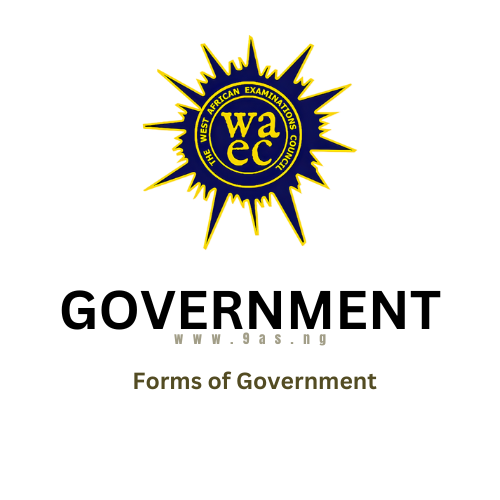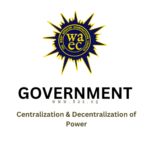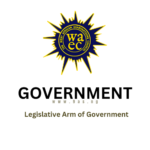THEORY
1. (a) Define republican form of government (b) State the essential characteristics of republican government.
2. Discuss the factors that hinder the successful operation of democracy in Nigeria.
3. Explain the term representative government.
4. What conditions are essential for the existence of a representative government?
5. (a) Define democracy (b) What conditions are necessary for its successful operation?
6. (a) Highlight any three merits of democracy. (b) Highlight any three demerits of democracy.
7. Describe the basic features of a democratic state.
8. What is a representative government?
9. State two features of a representative government.
10. Outline three conditions necessary for a representative government.
11. Highlight six characteristics of a democratic government.
OBJECTIVES
1. A system of government where political powers are inherited is called
A. monarchy.
B. diarchy. C. democracy. D. aristocracy.
2. The modern idea of democracy includes all the following except
A. unlimited freedom. B. universal suffrage. C. periodic elections. D. equality before the law.
3. Democracy can be promoted through
A. gerrymandering. B. Slander. C. accountability. D. lobbying.
4. Voting at elections is one of the ways to
A. maintain law and order. B. help politicians. C. be a good politician. D. ensure a representative government.
5. Which of the following is a feature of democracy?
A. Majority rule. B. Election by selected adults. C. Quick decision making. D. Rule by wealthy men.
6. An essential feature of democracy is
A. election by all adults. B. government by few wealthy men C. participation by everyone in the economic sector. D. majority rule.
7. The modern idea of democracy includes all the following except
A. unlimited freedom. B. civil liberty. C. periodic elections. D. equality before the law.
8. The system that allows the opposition to participate in governance is
A. dictatorial. B. collectivisim. C. aristocratic. D. democratic.
9. Which of the following hinders the establishment of a representative government in a state?
A. Mass illiteracy. B. Existence of pressure groups. C. Vibrant political culture. D. Independent electoral commission.
10. In a democracy, political sovereignty is vested in the
A. judges. B. people. C. legislature. D. executive.
11. For democracy to be sustained in a country it needs a
A. rich political leader. B. well-informed electorate. C. partial electoral commission. D. large police force.
12. Representative democracy is characterized by
A. free election and proper registration of voters. B. unlimited expenditure of political parties. C. a politically educated electorate. D. representation of the poor only.
13. A country is said to be democratic if
A gerrymandering exists. B. there are free and fair elections. C. citizens are disenfranchised. D. the press is owned by the government.
14. Government by the few for the interest of the few is
known as A. monarchy. B. dictatorship. C. autocracy. D. oligarchy.
15. The acquisition of political power through hereditary
means is a feature of
A. communalism.” B. capitalism. C. oligarchy. D. monarchy.
16. A representative government is one in which
A. The executive controls the judiciary. B. half of the parliament is popularly elected. C. traditional rulers form the majority in parliament. D. the ultimate power resides with the people.
17. Which of the following is a characteristic of democracy?
A. There is absolute freedom of movement. B. Courts can sue and be sued. C. The majority have their way. D. All citizens vote and be voted for.
18. Direct democracy emanated from the
A. Greeks. B. Romans. C. Germans. D. Americans.
19. Which of the following factors may work against a representative system of government?
A. High literacy of the electorate. B. the introduction of universal adult suffrage. C. Independent electoral commission D. Rigging of elections.
20. A system of government that is made up of elected people is referred to as
A. representative government. B. socialist government. C. capitalist government. D. feudalist government.
21. A government in which the control of ultimate power is by a few who rule for their own selfish interest is classified as
A. a democracy. B. a dictatorship. C. aristocracy. D. an oligarchy.
22. Classical democracy implies government
A. Through representatives. B. by all citizens. C. through electoral college. D. by martial laws.
23. Which of the following is not a feature of a democratic system of government?
A Limited franchise. B. Official opposition. C. Periodic elections. D. Rule of law.
24. Direct democracy implies that the governance of a state involves
A. all the citizens of the state. B. only male citizens. C. adult female citizens. D. citizens’ representatives.
25. In a democracy, sovereignty is vested in
A. the legislature. B. the people. C. judges. D. public officials.
26. Nobles who form government are called
A. theocrats. B. aristocrats. C. plutocrats. D. autocrats.
27. A government headed by a person elected for a fixed period of time is referred to as
A. monarchical B. socialist. C. republican. D. military.
28. Representative democracy is characterized by
A. free election and proper registration of voters. B. a to politically educated elite. C. representation of the poor only. D. rule of the interest groups.
29. The origin of democracy is associated with the
A. Romans. B. Greeks C. Babylonians. D. Egyptians.
30. A government shared by two authorities is called.
A. diarchy. B. theocracy. C. gerontocracy. D. aristocracy.
31. In democracy, political sovereignty resides with the
A. Judiciary. B. President. C. Legislature. D. Electorate
32. The rule of the privileged nobility is referred to as
A. plutocracy. B. monarchy. C. aristocracy. D. autocracy.
33. Which of the following is a basic principle of democracy? Rule by
A. the majority and the right of the minority. B. the minority at the expense of the majority. C. the wealthy few. D. a monarch.
34. A true representative government is one that
A. resists freedom of movement. B. recognizes unlimited franchise. C. observes customs and
traditions. D. allows devolution of governmental powers.
35. A system of government in which the head of state is elected for a fixed term of office is known as
A. republican. B. monarchical. C. confederal. D. federal.
36. A representative government can be established through
A. a general election. B. a military coup. C. an imposition. D. espionage.
37. A system of government in which governmental positions are acquired through popular elections is known as
A. fascism. B. confederalism. C. monarchy. D. republicanism.
38. In a democracy which of the following can exert appreciable control on the activities of the Executive
A. Military. B. Legislature. C. Traditional Rulers. D. Police.
39. A feature of democratic government is that it is
A. authoritarian and totalitarian. B. brutal and repressive. C. firm and disciplined. D. representative and accountable.
40. Democracy originated from
A. Greece. B. Britain. C. USA. D. Germany.
41. Which of the following is a basic principle of democracy? Rule by
A. the majority and the protection of the minority. B. the wealthy few. C. the minority at the expense of the majority, D. two political parties.
42. Absence of government in a state is referred to as
A. anarchy. B. confusion. C. coup d’etat. D. instability.
43. A situation where all the citizens meet in an open place to govern the state is called
A. direct
democracy. B. electoral college. C. representative democracy. D. guided democracy.
44. A system of government in which the political power is vested in the elected representatives is known as
A. oligarchy. B. democracy. C. feudalism. D. fascism.
45. Oligarchy implies rulership by
A. an absolute monarch. B. a few powerful individuals. C. a military government. D. a charismatic leader.
46. In modem democracies, a government is
A. a contract between the rulers and the ruled. B. a preserve of the political party in power. C. monopoly of the ethnic groups in the majority. D. alternation of power between the majority and minority tribes.
47. Which of the following factors does not militate against representative government in West Africa?
A. Electoral irregularities. B. Coup d’etat. C. Gagged media. D. Universal adult suffrage.
48. Which of the following best describes an absolute monarchy?
A. He wields the supreme power in a state. B. is elected by an electoral college. C. is elected by the electorate. D. had fixed tenure of office.
49. In a monarchy, the Head of State is usually
A. a military ruler. B. the chief justice. C. the speaker of the legislature. D. a hereditary ruler.
50. Monarchy means government
A. headed by a king. B. by the people. C. of the majority. D. run by the elite.
51. One of the features of an absolute monarch is that the ruler
A. is elected by the electorate. B. has a definite tenure of office. C. is elected by representatives of the people. D. wields the supreme power in a state.
51. In a constitutional monarchy, the king or queen is referred to as
A. ceremonial head. B. political head. C. constitutional head. D. democratic head.
52. Rule by divine right is a feature of
A. the republican system. B. the feudal system. C. absolute monarchy. D. democracy.
53. Which of the following is a unique feature of a monarchy?
A. Members of the Executive are popularly elected. B. Succession is hereditary. C. Separation of powers is absolute. D. Its operation is based on collective responsibility.
54. The type of government that is headed by a king or queen is called
A. monarchical. B. federal. C. presidential. D. republican.
55. A monarchy refers to
A. getting political office by election. B. capturing political office by force. C. selection into office by a Council of State. D. hereditary right to a political office.
56. In a constitutional monarchy, the Head of State performs mainly
A. executive functions. B. judicial functions. C. administrative functions. D. ceremonial functions.
57. A good example of an absolute monarch is
A. Adolf Hitler of Germany. B. Benito Mussolini of Italy. C. Haile Salessie of Ethiopia. D. Margaret Thatcher of As Britain.
58. One of the limitations to the principles of rule of law is
A. Immunity. B. Equality. C. Liberty. D. Impartiality.
59. The observance of Rule of Law in a state requires
A. an independent judiciary. B. an ineffective police system. C. a flexible constitution. D. existence of a two- party system.
60. An undesirable attribute of capitalism is mostly seen in
A. freedom of choice. B. exploitation C. efficient production of goods and services. D. effective utilization of labour.
61. In a representative government, citizens exercise their political power
A. directly B. indirectly C. in reverence for the political system D. under undue political pressure
62. One of the importance of voting in a democracy is that it
A. is less expensive B. ensures development for all voters C. commits citizens to the political system D. ensures winner takes all policy.
63. The following options are today the biggest treat to the democracy of West African States except
A. election disputes and related violence B. military intervention in politics C. youth unemployment D. non-involvement of traditional rulers in politics.
64. A democratic country is one in which the people have the right to
A. participate in decision making B. disregard laws they abhor C. violently overthrow a government D. punish government by not honoring tax obligation.
65. The cornerstone of a functioning democracy is the
A. expenditure pattern of the executive B. appropriation bill C. foreign policy and military alliances D. free and fair elections.



